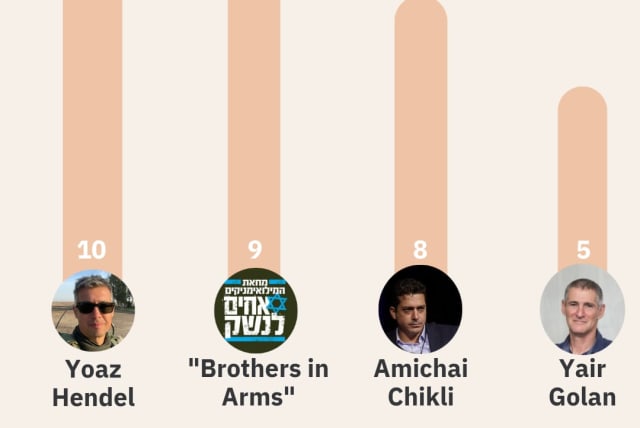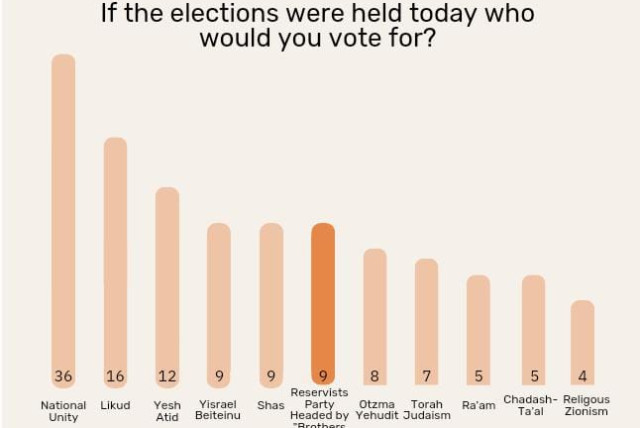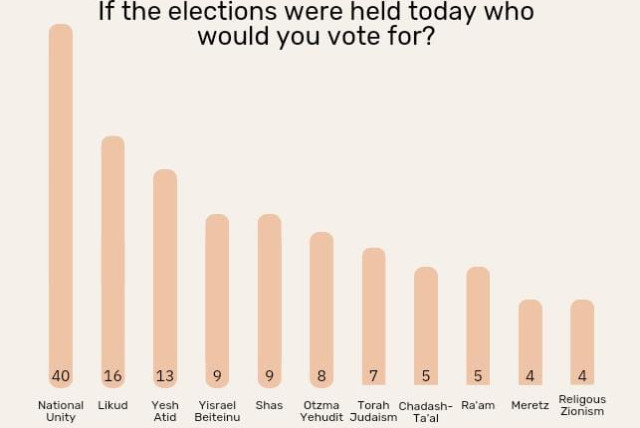'JPost' election poll: New party of IDF reservists shakes up Israeli politics

According to the poll, a reservists’ party headed by Diaspora Affairs and Combating Antisemitism Minister Amichai Chikli (Likud) would win eight seats.
A new party of IDF reservists who served in the Gaza Strip would receive 10 seats if led by former communications minister Yoaz Hendel, a poll conducted for The Jerusalem Post found this week.
The poll also found that a reservists’ party headed by other candidates with a military background would garner strong support. Hendel is not in the Knesset and does not officially belong to any political party.
According to the poll, a reservists’ party headed by Diaspora Affairs and Combating Antisemitism Minister Amichai Chikli (Likud) would win eight seats. Chikli served as a reserve soldier briefly at the beginning of the war.
The results of the poll
A reservists’ party headed by former deputy economy minister Yair Golan (Meretz) would gain five seats, according to the poll.
A party by the leaders of the Brothers in Arms movement would receive nine seats. The Brothers in Arms movement was established during the judicial reform process and later mobilized many of its supporters to assist in the aftermath of the October 7 massacre.
The poll also found that if the reservists’ party is headed by Hendel or Chikli, the Religious Zionist Party led by Finance Minister Bezalel Smotrich would not pass the electoral threshold. If the reservists’ party is led by Brothers in Arms, the Meretz Party would be impacted. But if Golan heads the new party, his five seats would enable Meretz and his party to pass the threshold.
The poll indicates the power of reservists currently serving in the Gaza Strip, and that if they vote as a bloc, they could sway the outcome of a future election.
In all of the different scenarios that the poll checked, National Unity Party voters comprise the main electorate of the new Reservists’ Party, and three or four of its seats would move to the Reservists’ Party.
Another primary source of voters for the new party would be undecided voters or those unwilling to vote for any current party.
Taking the right-winged approach in the war
The past few weeks have already seen several initiatives by recently released reservists to impact Israel’s political map. Most of them are calling for a decisive, right-wing approach to winning the war and replacing Israel’s current leadership.
The poll by Dr. Menachem Lazar found that a new reservists’ party headed by right-wing Hendel or Chikli would bring Netanyahu’s coalition to an all-time low of 40 seats.
The poll also examined who the public is most interested in seeing lead the rehabilitation of Israel after the war.
Benny Gantz had 53% support, followed by Gadi Eisenkot (50%), Naftali Bennett (46%), and Yossi Cohen (45%).
Other possible candidates, in order of support, were Chili Tropper, Nir Barkat, Yoaz Hendel, Yair Lapid, Benjamin Netanyahu, Itamar Ben-Gvir, Yair Golan, and Bezalel Smotrich.
Yossi Cohen had the smallest difference in bipartisan support between voters on the Right and Center-Left, at 3%. The candidates with the most significant difference were Netanyahu (50% difference), Ben-Gvir (49%), and Lapid (47%).
The poll was conducted in light of the vacuum felt by a drop in support for the Likud and the significant change occurring among the hundreds of thousands of reservists who enlisted to fight in Operation Swords of Iron.
The survey took place on January 24-25, with 513 participants. The respondents were a representative sample of the adult population, including both Jewish and Arab citizens aged 18 and above.
The margin of error was 4.3%, the pollsters said.
Jerusalem Post Store
`; document.getElementById("linkPremium").innerHTML = cont; var divWithLink = document.getElementById("premium-link"); if (divWithLink !== null && divWithLink !== 'undefined') { divWithLink.style.border = "solid 1px #cb0f3e"; divWithLink.style.textAlign = "center"; divWithLink.style.marginBottom = "15px"; divWithLink.style.marginTop = "15px"; divWithLink.style.width = "100%"; divWithLink.style.backgroundColor = "#122952"; divWithLink.style.color = "#ffffff"; divWithLink.style.lineHeight = "1.5"; } } (function (v, i) { });


